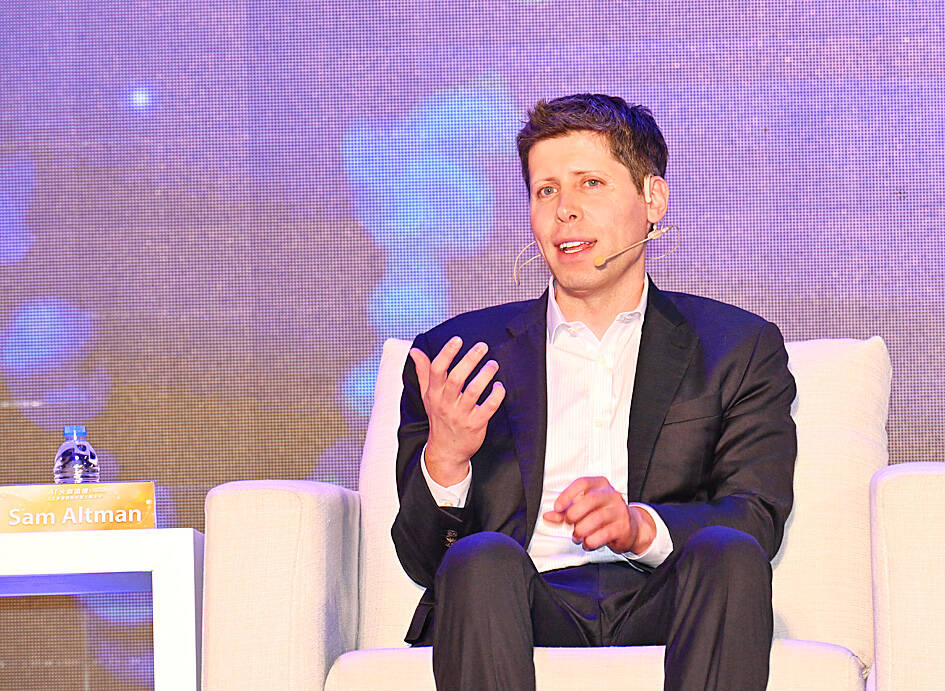ChatGPT creator OpenAI’s CEO yesterday said it was possible to get regulation wrong, but this should not be feared, amid global concerns about rapid advances in artificial intelligence (AI).
Many countries are planning AI regulation, and the UK is hosting a global AI safety summit in November, focusing on understanding the risks posed by the frontier technology and how national and international frameworks could be supported.
Taiwan is drafting an act to govern AI, which would cover the legal definition of AI, privacy protections, data governance, risk controls and related ethical principles, the National Science and Technology Council said in July.

Photo: Tien Yu-hua, Taipei Times
Sam Altman, CEO of Microsoft Corp-backed OpenAI, said during a Taipei visit that although he was not so worried about government over-regulation, it could happen.
“I also worry about under-regulation. People in our industry bash regulation a lot. We have been calling for regulation, but only of the most powerful systems,” he said.
“Models that are like 10,000 times the power of GPT4, models that are like as smart as human civilization, whatever, those probably deserve some regulation,” added Altman, speaking at an AI event hosted by the charitable foundation of Terry Gou (郭台銘), the founder of major Apple Inc supplier Hon Hai Precision Industry Co (鴻海精密), also known as Foxconn Technology Group (富士康科技集團).
Altman said that the tech industry has a “reflexive anti-regulation thing.”
“Regulation has been not a pure good, but it has been good in a lot of ways. I do not want to have to make an opinion about every time I step on an airplane how safe it is going to be, but I trust that they are pretty safe and I think regulation has been a positive good there,” he said.
“It is possible to get regulation wrong, but I don’t think we sit around and fear it. In fact we think some version of it is important,” he said.
Gou, an independent candidate running for Taiwan’s presidency, attended the forum but did not speak at the event.
Additional reporting by CNA

MULTIFACETED: A task force has analyzed possible scenarios and created responses to assist domestic industries in dealing with US tariffs, the economics minister said The Executive Yuan is tomorrow to announce countermeasures to US President Donald Trump’s planned reciprocal tariffs, although the details of the plan would not be made public until Monday next week, Minister of Economic Affairs J.W. Kuo (郭智輝) said yesterday. The Cabinet established an economic and trade task force in November last year to deal with US trade and tariff related issues, Kuo told reporters outside the legislature in Taipei. The task force has been analyzing and evaluating all kinds of scenarios to identify suitable responses and determine how best to assist domestic industries in managing the effects of Trump’s tariffs, he

TIGHT-LIPPED: UMC said it had no merger plans at the moment, after Nikkei Asia reported that the firm and GlobalFoundries were considering restarting merger talks United Microelectronics Corp (UMC, 聯電), the world’s No. 4 contract chipmaker, yesterday launched a new US$5 billion 12-inch chip factory in Singapore as part of its latest effort to diversify its manufacturing footprint amid growing geopolitical risks. The new factory, adjacent to UMC’s existing Singapore fab in the Pasir Res Wafer Fab Park, is scheduled to enter volume production next year, utilizing mature 22-nanometer and 28-nanometer process technologies, UMC said in a statement. The company plans to invest US$5 billion during the first phase of the new fab, which would have an installed capacity of 30,000 12-inch wafers per month, it said. The

Taiwan’s official purchasing managers’ index (PMI) last month rose 0.2 percentage points to 54.2, in a second consecutive month of expansion, thanks to front-loading demand intended to avoid potential US tariff hikes, the Chung-Hua Institution for Economic Research (CIER, 中華經濟研究院) said yesterday. While short-term demand appeared robust, uncertainties rose due to US President Donald Trump’s unpredictable trade policy, CIER president Lien Hsien-ming (連賢明) told a news conference in Taipei. Taiwan’s economy this year would be characterized by high-level fluctuations and the volatility would be wilder than most expect, Lien said Demand for electronics, particularly semiconductors, continues to benefit from US technology giants’ effort

‘SWASTICAR’: Tesla CEO Elon Musk’s close association with Donald Trump has prompted opponents to brand him a ‘Nazi’ and resulted in a dramatic drop in sales Demonstrators descended on Tesla Inc dealerships across the US, and in Europe and Canada on Saturday to protest company chief Elon Musk, who has amassed extraordinary power as a top adviser to US President Donald Trump. Waving signs with messages such as “Musk is stealing our money” and “Reclaim our country,” the protests largely took place peacefully following fiery episodes of vandalism on Tesla vehicles, dealerships and other facilities in recent weeks that US officials have denounced as terrorism. Hundreds rallied on Saturday outside the Tesla dealership in Manhattan. Some blasted Musk, the world’s richest man, while others demanded the shuttering of his